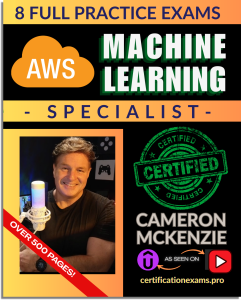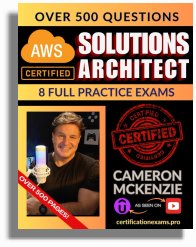AWS Machine Learning Study Guide
 The AWS Certified Machine Learning Specialty exam rewards candidates who can design, build, train, tune, deploy, and operate ML solutions on AWS with confidence.
The AWS Certified Machine Learning Specialty exam rewards candidates who can design, build, train, tune, deploy, and operate ML solutions on AWS with confidence.
The AWS Certified Machine Learning Specialty Book of Exam Questions & Answers by Cameron McKenzie is one of the most complete and thoughtfully designed resources for passing this specialty exam.
If your long term plan includes a broader journey through the AWS certification catalog you will appreciate how this book aligns with core AWS patterns that also appear in AWS machine learning learning paths, the foundational Cloud Practitioner, and adjacent specializations such as Security, Data Engineer, Developer, and DevOps.
It earns a full five stars and I recommend it to anyone who wants to get certified with confidence.
The content is technical yet accessible, the voice is friendly and clear, and the material builds both knowledge and exam judgment in a steady and encouraging way. For question stamina you can also warm up with a large bank like this Udemy practice exam collection and then move into ML specialty sets.
AWS ml exam topics
The book maps closely to what you will face on test day. You practice how to weigh tradeoffs across data quality, feature engineering, model choice, deployment, monitoring, security, and cost in real scenarios that feel authentic. This is consistent with the domain layout you see in the official guide and with overviews on the ML Specialty page and related AI Practitioner materials.
- Data engineering with lakes on Amazon S3, ingestion with Amazon Kinesis and AWS Glue, distributed ETL on Amazon EMR, and storage options that align with privacy and cost goals that you also meet in AWS Data Engineer prep.
- Exploratory data analysis with sanitation, outlier handling, scaling, tokenization, and visualization, plus practical use of notebooks that translates well to multi cloud paths like GCP Data Practitioner.
- Modeling with classical algorithms such as logistic regression, XGBoost, and k means, deep learning with CNNs and RNNs, transfer learning, and LLM fundamentals that complement the GCP ML Engineer path and the Generative AI Leader track.
- Implementation and operations with Amazon SageMaker training, hyperparameter tuning, endpoints, batch transform, shadow testing, A/B evaluation, monitoring, and lineage that echo ideas you will also see as an AWS DevOps practitioner.
How the structure builds real skills
Every question comes with a full explanation. You learn why the correct option works and you learn why the other options do not. This trains you to think like an ML solutions architect rather than a guesser.
When a prompt points to a SageMaker real time endpoint you also see why an AWS Lambda function would not meet latency or scaling requirements and why batch transform would not satisfy a real time use case.
When a prompt emphasizes class probabilities across all labels you learn to read a confusion matrix and compare it with ROC AUC and F1.
That back and forth reasoning builds a mental model you can reuse across many questions and across adjacent tracks like AWS Security and AWS Developer.
Sample coverage inside the book
The structure of the book helps you see how concerns work together in practical designs and it mirrors domain coverage seen in AWS machine learning study plans.
- Design secure ML solutions with IAM roles, VPC endpoints, encryption with AWS KMS, private data access, anonymization, and governance that match patterns you may have seen as a GCP Security Engineer.
- Design resilient pipelines with multi AZ thinking, retries, decoupling with Amazon SQS and Amazon SNS, health checks, and graceful failure using Amazon Step Functions which resonates with GCP DevOps Engineer style systems.
- Design high performing training and inference with the right compute, storage, caching, and data access using GPU or CPU, managed spot training, and model artifact optimization which maps to the skills of a GCP Professional Data Engineer.
- Design cost optimized solutions with smart S3 storage classes, right sizing of instances, Savings Plans awareness, and cost aware data movement which aligns with real world tradeoffs in AWS Solutions Architect roles.
Exam tips that build meta skills
After each ML specialty question you get an exam tip that helps you think about how the test is built.
These short notes highlight cues in the wording that point to specific services or patterns.
When a stem mentions true labels and predicted labels for all classes the tip reminds you that you are looking at a confusion matrix.
When a stem emphasizes event time ordering and streaming windows the tip points you to Amazon Kinesis and windowed aggregations with AWS Glue or Amazon EMR.
These signals are equally useful when you branch into AI Practitioner or multi cloud roles like GCP Associate Cloud Engineer and GCP Professional Cloud Architect.
Why this structure works
Pattern recognition grows as you see the same decision frames from different angles.
Your error awareness improves as you begin to recognize traps behind tempting wrong answers. Your confidence rises because you come to understand both the winning choice and the near miss.
The book starts with foundation sets that reinforce essential ideas then moves into longer scenario items that build stamina and focus.
You feel steady progress as you advance and you can measure readiness without stress.
By the final chapters you are reading quickly and locking onto the primary requirement with ease which is the same mindset that helps on higher level paths like the Solutions Architect Professional.
Value beyond the exam
The explanations mirror the tradeoffs you face on real teams. You learn how to choose storage classes that balance cost and durability, how to design data access that promotes least privilege, and how to mix caching and database choices for both speed and reliability.
You also practice comparing SageMaker built in algorithms with custom training on Amazon EMR and when to prefer managed embeddings or feature stores. These lessons are useful whether your career leans into DevOps, Security, or cross cloud data work on GCP Database Engineer and GCP Network Engineer tracks.
Who should use this book
The AWS Certified Machine Learning Specialty Book of Exam Questions & Answers is ideal for data scientists and ML engineers who want a clear path to their first AWS specialty. It is equally helpful for experienced builders who want a fast tune up before test day.
Team leads can use it as a shared study resource that reinforces good design habits across a group that may also be preparing for Cloud Practitioner, Solutions Architect Associate, and the multi cloud options listed on the GCP catalog.
How to get the most from it
Read the explanations even when you chose the correct answer because those insights deepen understanding. Write down reasons that rule out each incorrect option so you build the habit of eliminating distractors.
Review the exam tip after each question and rephrase the pattern in your own words so it becomes part of your thinking. Retake the practice sets until both your score and your confidence grow together.
If you like structure, plan weekly sprints with Scrumtuous guidance and complement with targeted labs drawn from AWS machine learning objectives and cross references to GCP generative AI study notes.
Final verdict
The AWS ML specialty book delivers complete domain coverage, explanations that build real judgment, and exam tips that sharpen instincts. It is friendly and effective and it prepares you for the exam and for real ML solution design.
I recommend it wholeheartedly for anyone who wants to get certified and move forward in applied machine learning on AWS. If you plan a longer journey you can sequence this with foundational Cloud Practitioner, associate level Solutions Architect, and advanced roles such as Solutions Architect Professional while keeping an eye on comparable GCP certifications that round out a multi cloud profile.
Next Steps

The AWS Solutions Architect Book of Exam Questions by Cameron McKenzie
So what’s next?
A great way to secure your employment or even open the door to new opportunities is to get certified.
If you’re interested in AWS products, here are a few great resources to help you get Cloud Practitioner, Solution Architect, Machine Learning and DevOps certified from AWS:
- AWS Certified Cloud Practitioner Book of Exam Questions
- AWS Certified Developer Associate Book of Exam Questions
- AWS Certified AI Practitioner Book of Exam Questions & Answers
- AWS Certified Machine Learning Associate Book of Exam Questions
- AWS Certified DevOps Professional Book of Exam Questions
- AWS Certified Data Engineer Associate Book of Exam Questions
- AWS Certified Solutions Architect Associate Book of Exam Questions
Put your career on overdrive and get AWS certified today!


